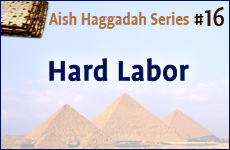 Iran’s Attack on Israel
Iran’s Attack on Israel


5 min read
When the Jews assimilate and become "full-fledged Egyptians," the result is anti-Semitism.
Dual Loyalty
"And the Egyptians ill treated us." As it says: "Come let us deal wisely with him, lest they multiply, and if it should happen that we are at war, then they will join our enemies, and fight against us and then leave this land." (Exodus 1:10)
The Jews assimilate, think they're full-fledged Egyptians, an accepted part of society. But what happens? Anti-Semitism. The Egyptians say, "Let's devise a plan against the Jews because they're becoming too powerful. They will join our enemies, and fight against us."
This is the famous question of dual loyalty. "We've got to control the Jews because if there's a war, they're going to be on the other side."
For the Jew who assimilates and thinks he is accepted by his host country, often it is horrific anti-Semitism which finally forces him to recognize that he's a Jew.
The Egyptians impose heavy taxes on the Jewish community. One way to disarm Jewish power is to take away their money. The next step is turning the Jews into slave labor, expected to produce higher and higher quotas of bricks. The Egyptians were trying to drive them into physical exhaustion and eventual extermination of the males.
It was a "grueling slavery." Why? Because the labor was meaningless. The Egyptians would mock the Jews and say, "Carry this bucket there. Okay, now carry it back here. Now carry it back again." It was work with no purpose. This drives a human being crazy. Even a slave can survive if he feels productive. But the Egyptians wanted to make the Jews feel absolutely meaningless. They wanted to break their spirits. They knew then the Jews would be truly enslaved.
Trying to Fit In
Rabbi Shraga Simmons
And the Egyptians ill-treated us, and they oppressed us and imposed upon us hard labor. (Deut. 26:6)
The Jews in Egypt were not enslaved outright. Rather, they were trapped by their own desire to be "accepted."
How did Pharaoh do it? First he invited all Egyptian citizens to participate in a public works campaign, to renovate the storage cities of Pitom and Raamses. The Midrash even says that Pharaoh himself wore a "brick-mold" around his neck, to set an example.
As could be expected, the Jews volunteered with great enthusiasm. They felt they had to prove themselves, in order to dispel any accusations that they were a disloyal "fifth column." So they worked harder than everyone else, putting in overtime and producing impressive quotas.
Slowly the Egyptians dropped out, leaving only Jewish workers. Then came Pharaoh's decree: Jewish labor was no longer voluntary! The Jews were hereby enslaved. And to make matters worse, the Egyptians had all along kept accurate records of Jewish production, and used this to determine the production quota for each person. The Jewish desire for acceptance had backfired in the worst way.
As the Haggadah quotes: "The Egyptians made the children of Israel serve a grueling slavery" (Exodus 1:13). The Hebrew word for "grueling slavery" is B'perach, which can also be read as Peh rach, meaning with a "soft mouth." Which is to say that the Jews, in effect, were "sweet-talked" into their own slavery.
Have we learned this lesson today?
Building Pitom and Ramses
Rabbi Shimon Apisdorf
And they oppressed us." As it says: "They placed taskmasters over them, in order to afflict them with burdens. And for Pharaoh they built store cities named Pitom and Ramses." (Exodus 1:11)
The human need for meaning may be second only to our need for air. It is so basic that even the existentialist who sees existence as nothing more than an anxiety- riddled fluke, is forced to come up with some sort of meaning with which to pad the dreary cell of life. It is so powerful that an entire branch of psychoanalytic thought rests on the assertion that when one is deprived of meaning, all is lost, yet given a sense of meaning, one can prevail over the worst suffering and deprivation.
Believe me, Pharaoh knew exactly what he was doing. The Talmud relates that the region of Pitom and Ramses was a wet, sandy marshland hardly fit for a construction site. But Pharaoh's real aim was destruction, not construction. He chose the site of Pitom and Ramses because he hoped that the futility of Jewish efforts would give rise to a sense of inescapable anguish. (Like being a sports fan in Cleveland.) Each morning the Jews were once again saddled with the fate of fruitless labors. Brick after meaningless brick, their hollow feeling of agony intensified.
Part of the responsibility of freedom is the obligation to fill our lives with meaning. And, in a world filled with a thousand follies masquerading as life's most cherished activities, that responsibility weighs particularly heavy.
In a gas-filled room a horrified human being will still desperately gasp for air. And when all else fails, the season-long saga of ones favorite team will just have to do.
Would you risk losing your home, or your arm or your life, for any of the following:
- Bringing famine relief to millions of starving people.
- Being the MVP quarterback of a Super Bowl champion.
- Winning an academy award.
- Bringing peace to the Middle East.
- Finding a cure for cancer.
